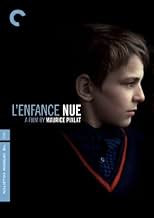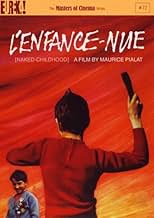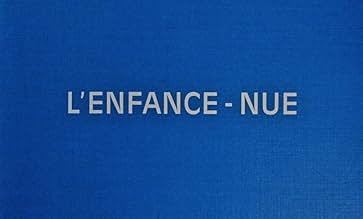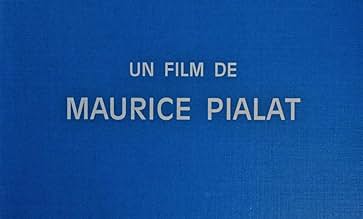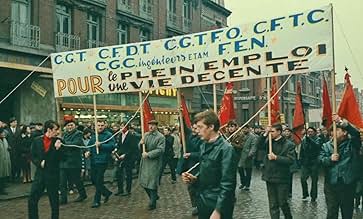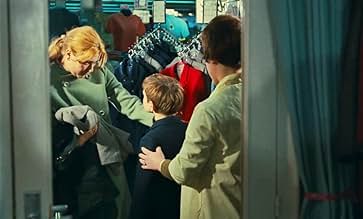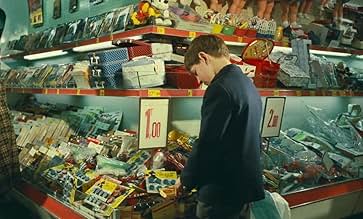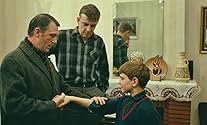IMDb RATING
7.4/10
2.8K
YOUR RATING
An anguished foster child takes to mischief and lies as his foster parents do their best to love and care for him. But it might be too little, too late in this emotionally devastating portra... Read allAn anguished foster child takes to mischief and lies as his foster parents do their best to love and care for him. But it might be too little, too late in this emotionally devastating portrayal of the orphaned child.An anguished foster child takes to mischief and lies as his foster parents do their best to love and care for him. But it might be too little, too late in this emotionally devastating portrayal of the orphaned child.
- Director
- Writers
- Stars
- Awards
- 1 win & 1 nomination total
- Director
- Writers
- All cast & crew
- Production, box office & more at IMDbPro
Featured reviews
It is quite extraordinary that 1968's L'Enfance Nue (or Naked Childhood) was the debut feature of a 43 year-old Maurice Pialat. Pialat would go on to direct a small number of highly-admired films after this, up until 1995, but it remains this film that he will be most remembered for. Similar in spirit but not in style to Francois Truffaut's masterpiece The 400 Blows, it follows the exploits of a troublemaking child who channels all of his rejection into ferocious anger that causes havoc with the people around him. Truffaut also has a co-producer credit for the film, although it would be the last time he would work with Pialat.
A young boy, Francois (Michel Terrazon), is placed in a home for bad children when his frequent outbursts and often psychopathic acts become too much for his mother. He is eventually re-homed and put into the care of an elderly couple, who also look after another older child, Raoul. When Francois warms to the elderly lady, his behaviour begins to become less hostile and he becomes familiar with his new surroundings. But a lifetime spent being unwanted has left it's mark on Francois, and he constantly remains unpredictable. Francois kills a cat, throws a knife at his new 'brother', and repeatedly steals from the other children. He is a horrific creation, and every parent's nightmare.
Pialat paints an interesting picture of France at the time. Without sledgehammering it home, he and the film depicts a time where a creeping poverty was lurking among the edges of suburbia. Perhaps this was one of the factors for Francois' parents being physically and mentally unable to keep the child, too distracted with their own situation that they don't have the time to get to the root of the problem. Or perhaps Francois is just a mischievous little bastard, and his inability to settle with one family before pushing them over the edge is his fault. L'Enfance Nue also has a surprisingly reserved depiction of the social services. They are seen simply doing their job, and repeatedly re- housing Francois every time he is rejected by a new foster family. This is where the genius lies in this film. Instead of using the film as a medium to send a social message (a la Ken Loach), Pialat sits back, points his camera, and tells a story. It is both complex and simple, but you would have to make your own mind up about that.
Much like Jean-Pierre Leaud in The 400 Blows, Michel Terrazon is fantastic in the lead role, brimming with menace and an unpredictability. Although the comparisons seem obvious, it would be wholly unfair to carry on comparing this to Truffaut's film, as L'Enfance Nue is a fantastic film in it's own right. Like most of his films, this is considered somewhat autobiographical to Pialat, but how much is unclear. His filmmaking techniques seem similar to the attitudes of the title character - this film is in your face and hard-hitting. You can almost hear the director yelling 'if you don't like it, then f**k you!'. A very, very good film, and I shall be seeking out more Pialat because of it. A remarkable debut.
www.the-wrath-of-blog.blogspot.com
A young boy, Francois (Michel Terrazon), is placed in a home for bad children when his frequent outbursts and often psychopathic acts become too much for his mother. He is eventually re-homed and put into the care of an elderly couple, who also look after another older child, Raoul. When Francois warms to the elderly lady, his behaviour begins to become less hostile and he becomes familiar with his new surroundings. But a lifetime spent being unwanted has left it's mark on Francois, and he constantly remains unpredictable. Francois kills a cat, throws a knife at his new 'brother', and repeatedly steals from the other children. He is a horrific creation, and every parent's nightmare.
Pialat paints an interesting picture of France at the time. Without sledgehammering it home, he and the film depicts a time where a creeping poverty was lurking among the edges of suburbia. Perhaps this was one of the factors for Francois' parents being physically and mentally unable to keep the child, too distracted with their own situation that they don't have the time to get to the root of the problem. Or perhaps Francois is just a mischievous little bastard, and his inability to settle with one family before pushing them over the edge is his fault. L'Enfance Nue also has a surprisingly reserved depiction of the social services. They are seen simply doing their job, and repeatedly re- housing Francois every time he is rejected by a new foster family. This is where the genius lies in this film. Instead of using the film as a medium to send a social message (a la Ken Loach), Pialat sits back, points his camera, and tells a story. It is both complex and simple, but you would have to make your own mind up about that.
Much like Jean-Pierre Leaud in The 400 Blows, Michel Terrazon is fantastic in the lead role, brimming with menace and an unpredictability. Although the comparisons seem obvious, it would be wholly unfair to carry on comparing this to Truffaut's film, as L'Enfance Nue is a fantastic film in it's own right. Like most of his films, this is considered somewhat autobiographical to Pialat, but how much is unclear. His filmmaking techniques seem similar to the attitudes of the title character - this film is in your face and hard-hitting. You can almost hear the director yelling 'if you don't like it, then f**k you!'. A very, very good film, and I shall be seeking out more Pialat because of it. A remarkable debut.
www.the-wrath-of-blog.blogspot.com
The ten year-old boy François (Michel Terrazon) is left by his parents for adoption. His foster families become unhappy with his evil behavior, practicing small thefts, killing pets and provoking car accident and reject him.
"L'enfance nue" is one of those well-made films that gives the sensation of a documentary to the viewer. In the late 60's, it was probably a realistic childhood docudrama to be discussed about orphaned children. Unfortunately the storyline is dated in 2017 and the troublemaker François is not as bad as he was in 1968. My vote is six.
Title (Brazil): "Infância Nua" ("Naked Childhood")
"L'enfance nue" is one of those well-made films that gives the sensation of a documentary to the viewer. In the late 60's, it was probably a realistic childhood docudrama to be discussed about orphaned children. Unfortunately the storyline is dated in 2017 and the troublemaker François is not as bad as he was in 1968. My vote is six.
Title (Brazil): "Infância Nua" ("Naked Childhood")
Arlette Langmann and Maurice Pialat wrote the screenplay for "Naked Childhood" and Pialat himself directed this film. In many ways, it is reminiscent of the story of Antoine Doinel in Truffaut's film "The 400 Blows", as it follows a neglected child through the foster care system--a very grim one indeed. Apparently, the story was inspired by an actual child who was raised by foster parents Marie-Louise and René Thierry--two folks who the director asked to appear in this film as the elderly foster parents.
This is the story about a young boy who was given up by his mother to the foster care system. The child, François (Michel Terrazon) acts out in response to being rejected in his first foster home--and as a result, is passed on to another foster home. The bottom line is that the boy has learned to be angry and violent and he appears to be headed for disaster unless something changes very quickly. Is there any hope for the kid? Can the elderly couple get through to him? This is an unusual film because it does not feature non-stop action and suspense. Sometimes the film is a bit slow--but not in a bad way--more like real life. It also features a little boy who is far from perfect but who is not constantly bad, either--he's more amoral than anything else. I liked this, as life is very rarely black & white--though it frequently is in movies. And, the film really doesn't have an ending. Because of this, the film feels more like a slice of life than a movie--which is pretty typical of the French New Wave style of the 1960s. It's probably not the sort of thing the average viewer would like, but it is a quality production. While this sort of thing does not make for the most pleasant viewing, having worked in the welfare system myself many years ago, I can certainly relate to the story of the boy--having seen kids passed on from one home to another to another. It's really no wonder the kids often act out and what is amazing is that many don't!
This is the story about a young boy who was given up by his mother to the foster care system. The child, François (Michel Terrazon) acts out in response to being rejected in his first foster home--and as a result, is passed on to another foster home. The bottom line is that the boy has learned to be angry and violent and he appears to be headed for disaster unless something changes very quickly. Is there any hope for the kid? Can the elderly couple get through to him? This is an unusual film because it does not feature non-stop action and suspense. Sometimes the film is a bit slow--but not in a bad way--more like real life. It also features a little boy who is far from perfect but who is not constantly bad, either--he's more amoral than anything else. I liked this, as life is very rarely black & white--though it frequently is in movies. And, the film really doesn't have an ending. Because of this, the film feels more like a slice of life than a movie--which is pretty typical of the French New Wave style of the 1960s. It's probably not the sort of thing the average viewer would like, but it is a quality production. While this sort of thing does not make for the most pleasant viewing, having worked in the welfare system myself many years ago, I can certainly relate to the story of the boy--having seen kids passed on from one home to another to another. It's really no wonder the kids often act out and what is amazing is that many don't!
This is Maurice Pialat's debut movie and François Truffuat offered him to produce his first effort. Not only because he was at the time a seasoned filmmaker (a dozen of films so far for a man who was 36 years old whereas Pialat shot his first film when he was 42!) but because the topic could only please him. Indeed, Truffaut's first film, "les 400 coups" (1959) revolved around the same subject and was a big critical, commercial hit. However, Truffaut like the rest of the crew who worked with Pialat wasn't prepared to the director's unconventional shooting methods and consequently the two men will never talk to each other again for several years.
Pialat used to say that he refused everything planned in the shooting of his films and "l'Enfance Nue" was inescapable to this scheme. Better, it was indispensable to have a genuine, deeply moving work as a result. Created in the chaos with tensions and having to rely on a shoestring budget, "l'Enfance Nue" is part of the top five films about stolen childhood alongside Julien Duvivier's "Poil De Carotte" (1932) and Luigi Commencini's "Incompreso" (1966). What "les 400 Coups" tried to reach, "l'Enfance Nue" achieved it. It's a much stronger flick than Truffaut's very overrated work. The piece of work from the former critic at the fusty "Cahiers Du Cinéma" suffered from a loose narration and cardboard characters which made it a bit humdrum to watch.
Given the two other films Pialat gave us after his 1969 vintage: "Nous Ne Vieillirons Pas Ensemble" (1972) and "La Gueule Ouverte" (1974), these three films have often been perceived as a sort of trilogy of life and Pialat's treatment of stolen childhood is drastically different to Truffaut's. He opted for a nearly documentary approach and tried as best as he could to reproduce working class life as it was in the Northern France of the sixties. A method he will tap again with gusto for his next two films. And you can only marvel at Pialat's remarkable camera work and observation. The hero François is a cruel child, perhaps worse than Antoine Doinel who never threw a cat from the top of the stairs! He goes from household to household because his adoptive parents can't stand his cruelty. He's not the only one like that. At the beginning of the film, Pialat shows us numerous orphans in an orphanage who can't manage to find adoptive parents. But when François is put up by an elderly couple, he seems to have found human warmth and comfort from them. Feeling Pialat manages to convey to the audience in an astounding way. You must be tender towards the attention these little old people give to François like when Granny offers him a piece of cake after François was involved in a fight. And in a sequence close to "Cinéma Vérité", they talk about François with their own words and how much do they understand him! More than François's tragic story, Pialat's work encompasses a word picture of Northern France with its ways of life. His depiction is all the more genuine as he hired non professional actors who are in their own roles. During the shooting, Pialat used to write down excerpts of conversation these inhabitants had and to incorporate them in his film. This process of hiring "gifted amateurs" will be tapped again thirty years later for another film set in Northern France: Bruno Dumon's harrowing "la Vie De Jésus" (1997). Anyway, Pialat and Dumont understood well Robert Bresson's one of his cinematographic lessons: to hire non professional actors to reach the scale of purity. That's precisely what Pialat reached even if as a perfectionist he denied his film.
A hard-hitting approach of naked childhood made without any embellishment. Pialat's debut film gains to be as famous and celebrated as Truffaut's so called masterpiece. And be prepared for a river of emotions!
Pialat used to say that he refused everything planned in the shooting of his films and "l'Enfance Nue" was inescapable to this scheme. Better, it was indispensable to have a genuine, deeply moving work as a result. Created in the chaos with tensions and having to rely on a shoestring budget, "l'Enfance Nue" is part of the top five films about stolen childhood alongside Julien Duvivier's "Poil De Carotte" (1932) and Luigi Commencini's "Incompreso" (1966). What "les 400 Coups" tried to reach, "l'Enfance Nue" achieved it. It's a much stronger flick than Truffaut's very overrated work. The piece of work from the former critic at the fusty "Cahiers Du Cinéma" suffered from a loose narration and cardboard characters which made it a bit humdrum to watch.
Given the two other films Pialat gave us after his 1969 vintage: "Nous Ne Vieillirons Pas Ensemble" (1972) and "La Gueule Ouverte" (1974), these three films have often been perceived as a sort of trilogy of life and Pialat's treatment of stolen childhood is drastically different to Truffaut's. He opted for a nearly documentary approach and tried as best as he could to reproduce working class life as it was in the Northern France of the sixties. A method he will tap again with gusto for his next two films. And you can only marvel at Pialat's remarkable camera work and observation. The hero François is a cruel child, perhaps worse than Antoine Doinel who never threw a cat from the top of the stairs! He goes from household to household because his adoptive parents can't stand his cruelty. He's not the only one like that. At the beginning of the film, Pialat shows us numerous orphans in an orphanage who can't manage to find adoptive parents. But when François is put up by an elderly couple, he seems to have found human warmth and comfort from them. Feeling Pialat manages to convey to the audience in an astounding way. You must be tender towards the attention these little old people give to François like when Granny offers him a piece of cake after François was involved in a fight. And in a sequence close to "Cinéma Vérité", they talk about François with their own words and how much do they understand him! More than François's tragic story, Pialat's work encompasses a word picture of Northern France with its ways of life. His depiction is all the more genuine as he hired non professional actors who are in their own roles. During the shooting, Pialat used to write down excerpts of conversation these inhabitants had and to incorporate them in his film. This process of hiring "gifted amateurs" will be tapped again thirty years later for another film set in Northern France: Bruno Dumon's harrowing "la Vie De Jésus" (1997). Anyway, Pialat and Dumont understood well Robert Bresson's one of his cinematographic lessons: to hire non professional actors to reach the scale of purity. That's precisely what Pialat reached even if as a perfectionist he denied his film.
A hard-hitting approach of naked childhood made without any embellishment. Pialat's debut film gains to be as famous and celebrated as Truffaut's so called masterpiece. And be prepared for a river of emotions!
Naked childhood or L'enfance nue (original title) is a film that deals with issues such as under-privileged children, foster-parenting and in general children being raised apart from their parents. The director approaches his subject with a realistic, almost documentary narrative with the least amount of dramatization. Therefore viewers will be shown a pretty straightforward story about a troublesome kid and what he is going through with foster-parents, school, social service agents and so on.
I think the film does a good job at showing us that no one's to blame for what eventually happens in these scenarios and yet the current method is a failure for these children. It's a film that is not very shocking or disturbing (although there are couple scenes) but it can make one think for a while.
I think the film does a good job at showing us that no one's to blame for what eventually happens in these scenarios and yet the current method is a failure for these children. It's a film that is not very shocking or disturbing (although there are couple scenes) but it can make one think for a while.
Did you know
- TriviaMarie-Louise Thierry and René Thierry were real life foster parents. Maurice Pialat became acquainted with the couple and cast them in lead roles after he began researching the plight of children in the foster care system.
- ConnectionsFeatured in Prima la vita (2024)
- How long is Naked Childhood?Powered by Alexa
Details
Box office
- Gross worldwide
- $1,993
- Runtime1 hour 23 minutes
- Sound mix
- Aspect ratio
- 1.66 : 1
Contribute to this page
Suggest an edit or add missing content


